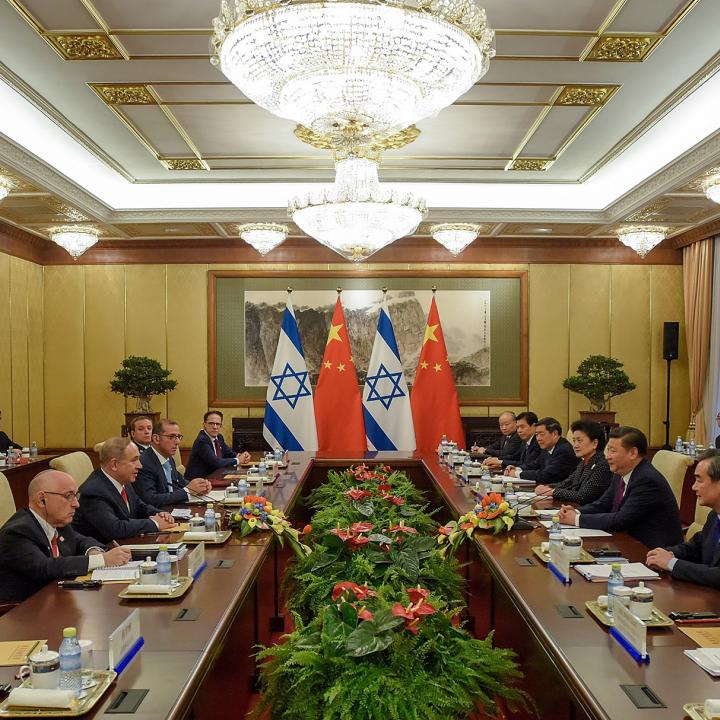
- Policy Analysis
- Articles & Op-Eds
Beyond Chastity Belt and Road U.S.-Israel Relations in the Age of Great Power Competition
Also published in Times of Israel

Israel’s ties to China have raised concerns in Washington, but select bilateral activity should be permissible in the context of an irreplaceable U.S.-Israel alliance.
In relations between Israel and the United States, how big a problem is China? Some Americans complain that Israel is too friendly to China and coming under its sway. The complaints highlight the major projects Chinese companies have built in Israel. Some critics have said that Israel has to choose between America and China.
But Israel made this choice long ago. Its ally, strategic and irreplaceable, is the United States. That, however, doesn’t preclude economic ties with China. America itself has such ties in abundance. There’s no reason to demand that Israel adopt what could be called a “Chastity Belt and Road” policy.
Since 2001, Israel’s trade with China has grown twelve-fold to more than $12b. But, for the last three years, Israel’s exports to China have been declining as have China’s investments in Israel. Such investments account for 8–10% of foreign direct investment in Israel, which is around a sixth of America’s share. In 2020, China accounted for less than 11% of Israel’s total foreign trade, far behind the EU (36%) and the U.S. (16%).
In the last five to ten years, U.S. policy toward China changed sharply, becoming more wary and resistant, and Israel is falling to some extent but not completely in line with Washington. America’s National Security Strategy of 2017 was its watershed line, and Jerusalem’s may have come with the change of government, if not earlier. The new government is reviewing its predecessor’s policies, including on China, and has been seeking to “reset” its relations with Washington for the better. It wants time to adapt. Israeli officials say they take seriously America’s concerns on China as a national security issue. They seem to get it.
The Trump administration raised concerns on China with Prime Minister Benjamin Netanyahu’s government, focusing on three main issues: on 5G, the U.S. reportedly cautioned against Chinese gear in Israel’s communication network (a “my way or the Huawei” kind of choice). In fact, unlike some of America’s other closest intelligence partners, Israel had already avoided such risk in its 4G and 3G networks. It did not need the U.S. warning. Critics described the operation of a part of Haifa Bay port by a Chinese company as a severe security risk that could make the port unusable for U.S. Navy vessels. But Israel has mitigated the risks. The container wharf cannot serve China’s navy. China’s role does not give it undue leverage on Israel, and Israel’s security agencies enjoy wide inspection authorities there against espionage threats. A port call by the U.S. Fifth Fleet’s USS O’Kane in October showed that the U.S. Navy is satisfied with the security of the port.
Washington also demanded stronger Israeli government oversight of foreign—especially Chinese—investments in Israel, along the lines of America’s Committee on Foreign Investment in the United States. Israel created an advisory mechanism in early 2020. It is not as strong as many hoped it would be, but it’s a step in the right direction, and improvements are expected.
Cyber and Espionage Threats
The winds of change are being felt in Israel. In recent tenders, some Chinese companies lost to their competitors, such as in desalination and power plants. Israel’s culture is rather informal, and given the right guidance, seemingly weak organs prove quite capable, while preferring to settle sensitive affairs quietly. On all three issues, Washington’s focus seems too narrow to address its own concerns. Instead of pointing at specific deals and action, the partners should engage higher up the strategic ladder, starting from ends rather than ways and means.
A major U.S. concern is that China’s quest for foreign technology targets Israel as a potential source. As research shows, China’s global tech transfer enterprise includes legal and illicit efforts, espionage and theft, business activity as well as academic relations, expanding well beyond investment. As China reportedly applies its toolkit worldwide with local adaptations, Israel may assume it faces similar risks. In August the international cybersecurity company FireEye reported that Israel was targeted by a massive cyber industrial and business espionage campaign, probably by China, indicating that the challenge to Israel is real and direct, beyond just Washington’s reservations.
Jerusalem has a real stake in the Great Power competition, as U.S. power and support are a central pillar in Israel’s national security. Yet China is not Israel’s enemy, nor does it wish it to be. Israel’s policy should then prudently combine supporting the U.S. with technology, innovation, cyber and defense R&D, while having fruitful, selective and safe economic relations with China; and taking America’s concerns seriously and trading with China while decreasing its own exposure to globally reported risks, including cyber and espionage threats, technology transfer, foreign influence and economic coercion challenges.
Jerusalem and Washington are gradually adapting their strategic partnership to the age of Great Power competition. As the U.S. seeks to increasingly focus its attention on the Indo-Pacific, striving for preeminence on the high grounds of advanced technologies, data and cyberspace, Israel can play an important supportive role. Israel can share the security burden in the Middle East while contributing to the West’s innovation base and cyber resilience. Recalling JFK’s address, Israeli leaders should continue to ask what they can do for America as it faces a historical challenge.
Brig. Gen. Assaf Orion (Res.) is the Rueven International Fellow with The Washington Institute and director of the Israel-China program at Israel’s Institute for National Security Studies. This article was originally published on the Times of Israel website.



